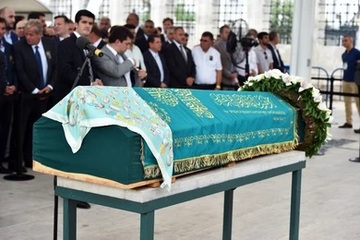Funeral Burial
Fiqh-Us-Sunnah, Volume 4, Janaa’iz (Funerals)
1. Advise the dying person to say: “La ilaha illa-Allah” (there is no god but Allah). It is narrated on the authority of Abu Sa’id al-Khudri that the Prophet, peace be upon him, said: “Prompt your dying people to say: ‘La ilaha illa-Allah’.” (Muslim, Abu Daw’ud, Tirmizhi) Another report on the authority of Mu’azh ibn Jabal states that the Messenger of Allah, peace be upon him, said: “He whose last words are ‘La ilaha illa- Allah’ shall enter Paradise.” (Narrated by Abu Daw’ud; Al-Hakim considers it a sound hadith)
This prompting (talqin) is necessary only when the dying person is unable to utter the shahadah (La ilaha illa- Allah . . . ). If such a person is able to utter these words then there is no need for prompting, but he should rather be advised to do so. Such advice is useful in cases of persons who are in possession of their faculties of reason and speech. If one is already mentally impaired such advice cannot be of benefit. But one who is unable to speak might say these words in his heart. The scholars are of the opinion that no pressure should be put on the dying person. So one should not say to him, “Say, ‘La ilaha ill-Allah’,” lest he should become annoyed and utter something improper. One may say the shahadah, however, in such a way that the dying person might be able to hear it and repeat it. If he utters it once, he should not be asked to repeat it unless he says some words after it. In such a case he should be asked to repeat shahadah to ensure that it be his last utterance.
Most scholars are of the opinion that one attending a dying person may repeat only the words: “La ilaha ill-Allah,” according to the apparent meaning of the hadith. Others are of the opinion that the dying person should be prompted to utter the two testimonies (that is, “I bear witness that there is no god but Allah, and I bear witness that Muhammad is His servant and Messenger”). The purpose is to remind him of the Oneness of Allah, which includes both of the two testimonies.
2. Lay the dying person so that the qibla is on his right side. To this effect it is recorded that Abu Qatadah said: “Upon arrival in Madinah, the Prophet, peace be upon him, enquired about a person called al-Bara ibn Ma’rur. The people told the Prophet, peace be upon him, that he had died, and had willed one-third of his property to the Prophet, peace be upon him, and that his face be turned toward the Ka’bah at the time of his death. Hearing this, the Prophet, peace be upon him, said: ‘He has been true to his innate nature. I return the one-third of his property to his children. ‘ Then the Prophet, peace be upon him, left and offered a prayer for him and prayed, saying: ‘O Allah! Forgive him, have mercy on him, and cause him to enter Your Paradise. Indeed, You have accepted this prayer’.” (Narrated by Al-Baihaqi and Al-Hakim, who observes: “I know of no hadith, other than this one, with regard to turning the face of a dying person toward Ka’bah.”)
Ahmad reported that Fatimah, the daughter of the Prophet, peace be upon him, at the time of her death, turned toward the Ka’bah and placed her right hand under her head. This is the sleeping position recommended by the Prophet, peace be upon him, and in a grave, a dead body should also be placed in the same position. A report recorded from Ash-Shafi’i says: The body of the deceased should be laid flat on his back with his feet toward the Ka’bah, and his face raised a little, facing it. The majority of scholars, however favor the first position and hold it to be preferable.
3. Recite Surah Ya Sin from the Qur’an. (Surah 36 of the Qur’an) This is reported by Ahmad, Abu Daw’ud, Nasa’i, Al-Hakim, and Ibn Hibban, and the last two of them grade it as a sound hadith. They report also on the authority of M’aqil ibn Yasar, that the Prophet, peace be upon him, said: “Ya Sin is the heart of the Qur’an. Whoever recites it seeking the pleasure of Allah and the hereafter will receive Allah’s forgiveness. So recite it to your dead.” (Ibn al-Qattan considers this hadith weak and manifests some confusion, doubt, and even ignorance about some of its narrators. Ad-Dar al-Qutni is reported to have said: “In the chain of narrators of this hadith there is confusion. Its text is obscure and is not correct.”) {{Note: This is unauthentic. However please read this (from IslamQA).}}
Ibn Hibban observes: This hadith refers to the recitation of Ya Sin for those on the eve of death and not for those already dead. This interpretation is supported by Ahmad, who recorded in his Al-Musnad that Safwan states: “The most eminent scholars say: ‘The recitation of Surah Ya Sin at the time of a person’s death makes death easy for him’. “The compiler of Musnad al-Firdaus attributes this hadith to Abu ad-Darda and Abu Zharr. They both narrated: “The Prophet, peace be upon him, said: ‘If any person is on his deathbed and Ya Sin is recited to him, Allah makes his suffering easier’.”
Please contact us for any further information.


